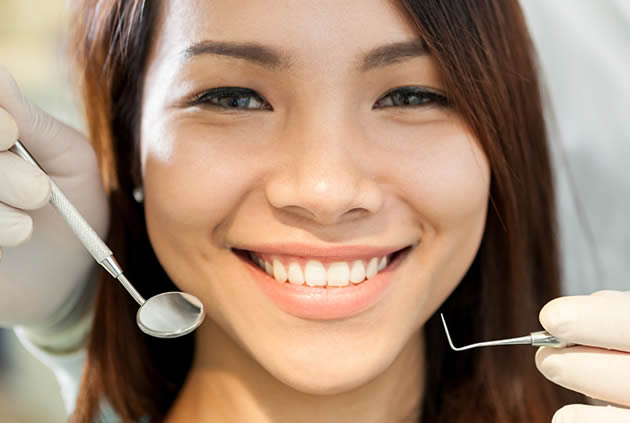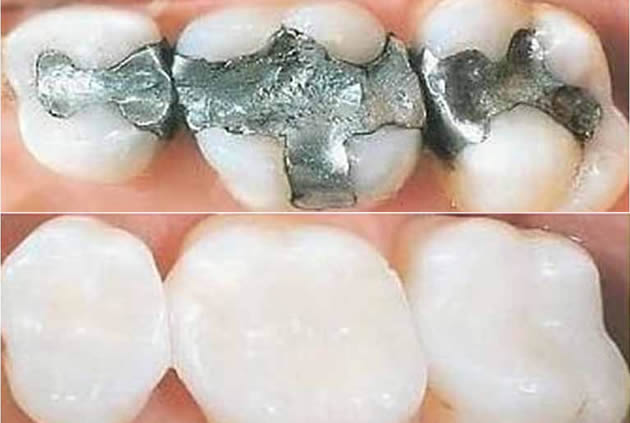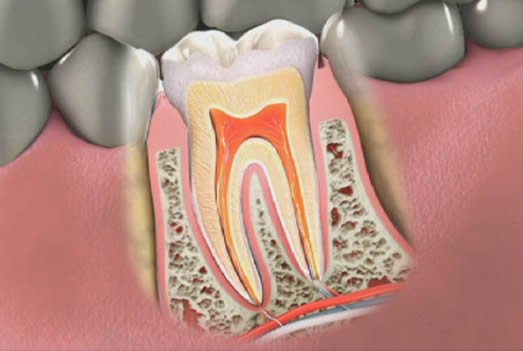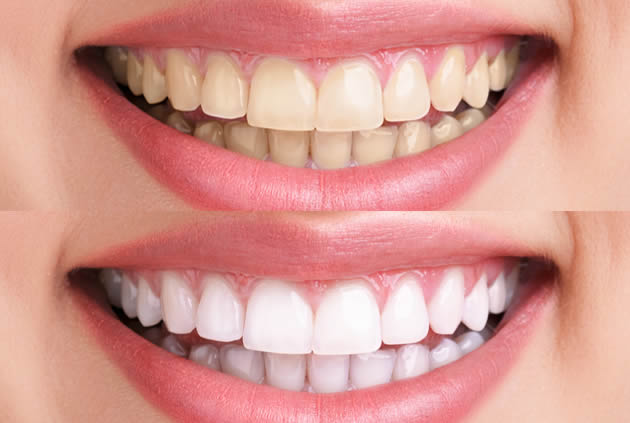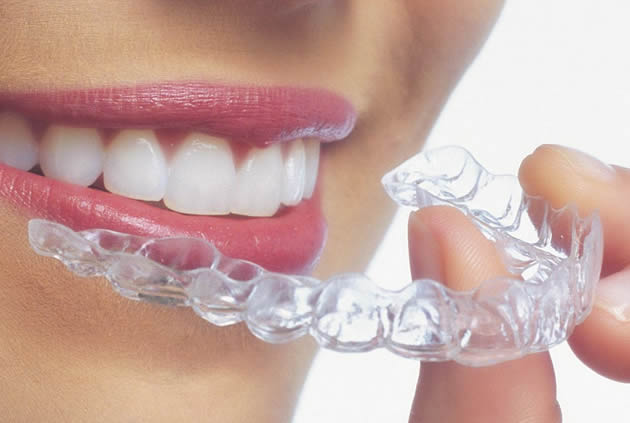
Trips to your family dentist for checkups and cleanings may not top your list of fun family activities, but there are important reasons you should make visits to the dentist a priority for your family. Excellent oral health depends heavily on prevention and by taking proactive steps, you can ensure your family will have years of beautiful, healthy smiles. The following reasons outline why regular care by your family dentist is vital to the overall health of your family:
Your family dentist will screen for oral cancer. In the United States, there is approximately one death every hour from oral cancer. Oral cancer is highly curable with early diagnosis and treatment.
Routine cleaning and checkups help to prevent the advancement of gum disease. When diagnosed early, gum disease is both treatable and reversible. However, left unchecked, advanced gum disease can enter your bloodstream leading to a higher incidence of heart disease and possibly stroke.
Maintaining good oral care is the best way to ensure you will keep your natural teeth for a lifetime. Gum disease left untreated can lead to tooth loss, causing a host of other potential problems.
Early detection of cavities, gum disease, and other issues by your family dentist will help you to avoid more serious problems which could lead to root canal treatment, tooth loss, or gum surgery. Early detection and treatment are the keys to avoiding larger dental emergencies.
Clearly, making appointments with your family dentist a priority in your family’s regular routine is a critical part of maintaining not only their excellent oral health, but also in ensuring their overall good health. Every member of your family should be scheduled for cleanings and checkups with your family dentist at least twice per year to ensure a lifetime of healthy smiles.
If you live in the Baltimore area contact us today

Everyone knows that tobacco is harmful to your health, but many people believe that smokeless tobacco doesn’t fall into the same category. Just because it’s smokeless doesn’t mean it’s harmless. It’s dangerous for your overall health, but also for your oral health. Here are some possible oral health outcomes of using smokeless tobacco.
Tooth decay
Smokeless tobacco contains sugar, which combines with the plaque on your teeth to damage your tooth enamel and cause decay.
Receding gums
Placing chewing tobacco in your mouth at the same spot over and over can permanently damage your gums. It can also harm your bone structure. Your irritated gums may pull away from your teeth, expose your tooth roots, and leave your teeth painful and susceptible to decay. Receding gums sometimes also loosen your teeth and cause them to eventually fall out.
Tooth discoloration
Smokeless tobacco stains your teeth, causing embarrassing yellow and brown discoloration. It is extremely difficult to remove with normal brushing, and even professional teeth whitening may not completely remove these stubborn stains.
Bad breath
Your breath will suffer from tobacco products of any kind. Don’t be fooled into thinking that mint-flavored smokeless tobacco hides the problem.
Tooth abrasion
Smokeless tobacco can be gritty and scratch your teeth, wearing down the enamel. Loss of tooth enamel increases sensitivity and may require treatment.
Cancer
The consistent placement of tobacco inside your gums and the irritating juices accompanying it can cause a pre-cancerous condition called leukoplakia. All smokeless tobacco contains cancer-causing agents, which subject users to higher cancer risk in the oral cavity, larynx, esophagus, and pharynx.
Our dental office is located in Baltimore
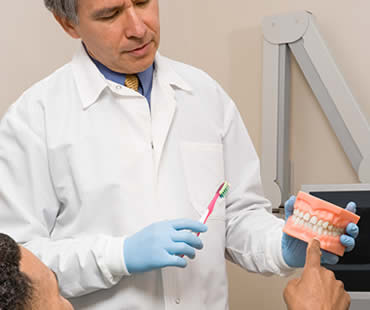
If you haven’t been to the dentist in a while, you may not recall the process for a regular checkup. These visits are an important part of your oral health care. If you are in good dental health, your dentist will probably suggest twice-yearly visits. Individuals with gum disease or other oral health concerns may need to schedule more frequent appointments. Feel free to ask your dentist questions or raise concerns at the visit.
Your dental checkup will usually include:
• Full Health History
Because oral health affects your overall wellness, your dentist will want to have a complete picture of your whole situation. A member of the dental team will ask you questions and gather relevant details about your present status. Make sure to provide helpful information like current medications and any pressing issues.
• X-Rays
Typically, your dentist will take X-rays about once a year. These images provide a clear view of your teeth and gums. Often, X-rays will identify problems, like impacted teeth, cysts, abscesses, or decay between teeth that might otherwise go undiagnosed.
• Complete Evaluation
During your checkup, the dentist will perform a periodontal assessment, bite analysis, and tooth-by-tooth inspection. If the dentist discovers a problem, your provider will make treatment recommendations to address the issue and restore your oral health.
• Thorough Cleaning
If everything checks out, the hygienist will typically remove plaque and tartar build-up from your teeth. At this time, the hygienist may also polish and floss teeth to refresh your smile.
If you live in the Baltimore area contact us today
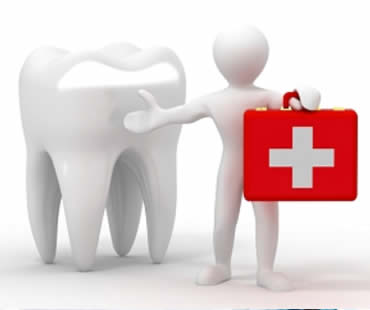
As much as you hope it doesn’t happen, dental emergencies can sneak up on you. Some clinics offer emergency dental care to provide quick, effective, and safe treatment. It’s important to know what kinds of dental problems require urgent care, as opposed to those that can wait until you can get a regular appointment with your dentist. Here are some common types of emergencies that warrant immediate treatment.
Severe toothache
A painful toothache that won’t go away should not be ignored. These can occur suddenly, be confined to a single area, cause pain when eating, and also involve your gums. Symptoms like these may indicate an abscess, which can also lead to facial swelling. Sometimes your airway can even become blocked. A severe toothache requires immediate relief, and therefore is considered a dental emergency.
Excessive bleeding
If you have oral bleeding from something like losing a tooth and you can’t get it under control, you need to see an emergency dentist. Normally when a tooth falls out, the bleeding will stop after a few minutes. If the blood won’t clot for some reason, or if there was severe trauma, excessive bleeding can occur. A dentist can help stop the bleeding by applying pressure, using a hemostatic agent, or even using stitches.
Fractured teeth
Infection may occur when a tooth is fractured, especially if the break goes deep into a permanent tooth, so immediate care is necessary. An emergency dentist will apply dentine padding to the affected area, so that you can visit your own dentist the next day for further treatment.
Surgery complications
If you have had oral surgery and the pain is more severe or lingering than your dentist anticipated, you should seek treatment immediately to make sure complications like a dry socket or jaw fracture hasn’t occurred.
If you have a dental emergency, contact our Baltimore dentists office.

It may be obvious when you’re in a situation that requires immediate treatment by a dentist. Perhaps you’re in immense pain, or you’ve had a tooth knocked out or bleeding that won’t stop. Examples like this make it easy to decide you need help right away, but sometimes it’s not as clear. What are some other problems that may require emergency dental treatment?
Cracked teeth
A cracked or fractured tooth is serious, and often means that the tooth has been damaged both on the inside and the outside. Many times the tooth can’t be saved. If your tooth is broken, schedule an emergency appointment immediately. Remember, a cracked tooth is different than a chipped tooth, which is not as serious. You can usually wait to see your dentist at the next available opportunity for a chipped tooth.
Lost fillings
Some lost fillings require immediate care to avoid worse issues. Fillings protect your tooth’s root from exposure, so if the filling falls out your root can be uncovered and cause intense pain. There is also increased risk for damage to your tooth’s structure, so seeing your dentist as soon as possible is suggested.
Lost crown
If your crown falls out, call your dentist for an appointment as soon as possible. Until you can see the dentist, try putting the crown back in place using an over-the-counter dental adhesive. Do not use any products like Super Glue. If the crown won’t stay in place, make sure you take it to your appointment with you so that it can be re-cemented correctly.
Abscess
If you have a painful swelling on your gum that resembles a pimple, it might be a serious condition called an abscess. It can damage gum tissue and teeth, as well as spread serious infection to your body. See your dentist immediately for proper treatment.
Emergency dentist in Baltimore – White Marsh Family Dentistry

An estimated 50 million Americans have lost all their teeth, and 69 percent of adults are missing at least one tooth. Without a full set of teeth, you may deal with alignment problems, dietary restrictions, and self-esteem issues. With modern dentures, your dentist can renew your appearance and improve oral health.
Dentures are prosthetic appliances created to replace missing teeth. Full dentures are rows of false teeth that cover the upper, lower, or both arches. If you still have some of your natural teeth, your dentist may suggest a partial denture, which fits into the empty space in your smile like a puzzle piece.
How do dentures feel?
At first, your prosthesis may take some getting used to, so give your mouth time to adjust. You may have some difficulty with pronunciation, but that will pass.
Will my dentures need to be replaced?
As we age, our mouth tissues change. Over time, your dentures may need to be repositioned, realigned, or entirely remade. Never make changes to your appliance; contact your dentist if something doesn’t seem right.
How do I care for my dentures?
To protect your dental appliance, handle the denture with care. When you take the device out, always store it safely in its case. Gently clean your dentures with mild soap and water to remove bacteria. Make sure to put the denture out of reach from small children or pets.
Do I still need to brush if I have dentures?
Absolutely. Your gums still need proper oral care, so brush them twice daily to keep the tissue healthy.
We offer dentures at our Baltimore dental office












